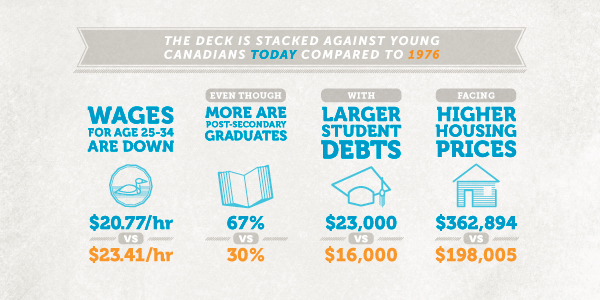Dear BC,
After 8 years together, I can’t believe it’s come to this. I thought I’d found the one when we first connected, the place I’d be forever. Now, it’s just not working out between us.
Your rugged good looks drew me to you in the beginning, along with all the opportunities you offered for fun and exploration. But since starting our family, your handsome looks and adventurous attitude are no longer enough.
We’re supposed to be raising our kids together. Sure, you promise to put “family first.” But your words are empty in the absence of action. Where are you when I’m squeezed between high housing prices, stagnant incomes, and the need for time at home with our kids? What are you doing to help pay for child care? Why can’t you help make this affordable, when you can afford new bridges, roofs for sporting arenas, theOlympics and a highway to the ski hill.
Cars, fun and games! Truth is BC, you’re just like a deadbeat dad.
Now that we have kids, what do I have to do to attract your interest again? I’m keeping up my end of the bargain. I work hard in employment. I work hard as a small-business owner. I work hard at home, and as a volunteer too. I stand on my own two feet. Why doesn’t this look good to you?
Don’t get me wrong – I know that you have lots of fine qualities. You dedicate much of your time and money to taking care of our aging parents, especially their health care and pensions. And it matters very much to me that they are supported.
But why can’t all members of our family benefit from your rich resources and wealth? Supporting retirees can happen alongside supporting our kids. In fact, if more of my parents’ generation knew how many of our children are failing to be ready for school, or are growing increasingly anxious anddepressed, or are living with low-incomes, they too would ask you to devotemore of your resources to the next generation.
I do love you, BC. I have held on to the dream of raising my children with you for many years. But as time goes on and our children become increasingly vulnerable, I don’t see you making the changes we need to be successful.
Since I’m not a quitter, I’ll give you 3 more months to shape up.
During this next provincial election, all provincial parties must finally speak to the needs of my generation – a generation in its prime child rearing years. Sure, keep talking about jobs, jobs, jobs. But know this focus is insufficient. I have a two jobs, and they leave me squeezed for time at home with my kids, squeezed to pay for higher housing prices, and squeezed to pay for child care services that cost more than post-secondary tuition. Unless you propose plans to reduce this squeeze, you cannot live up to the commitment you made to put our families first.
BC, I’m looking for a plan to reduce the squeeze on the generation raising young kids (see gensqueeze.ca). If you don’t have such a plan in the next campaign, then I am afraid I will have to find somewhere else that does.
Sincerely,
Gen Squeeze Mom & Small Business Owner.
